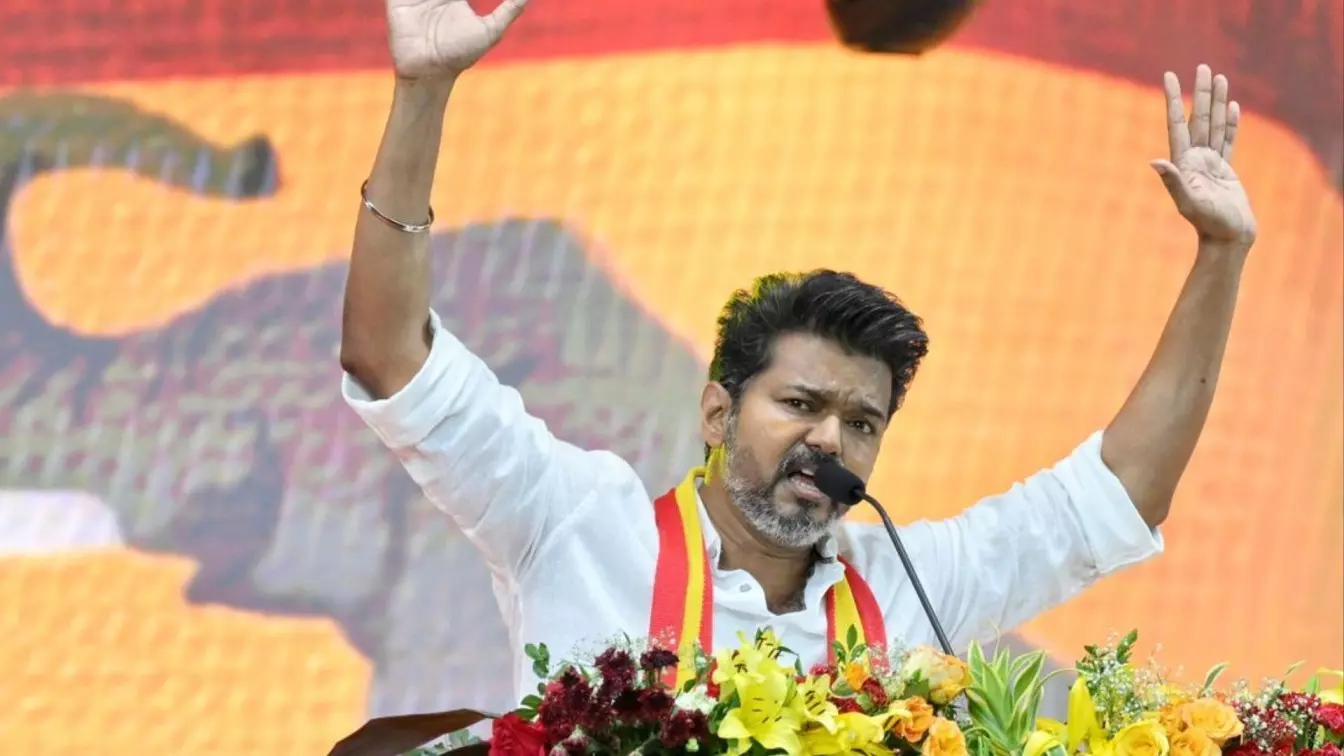
Madurai Maanadu: Can Vijay transform popularity into political power?
Vijay’s Madurai show: Can fan frenzy turn into political power?
As TVK’s second state conference draws massive crowds, analyst T Ramakrishnan cautions that Vijay’s real test lies in converting popularity into votes

As Tamil actor-turned-politician Vijay prepares to host his second state conference of Tamilaga Vetri Kazhagam (TVK) in Madurai, political observers are keenly watching whether his massive crowd-pulling ability can evolve into a meaningful political force. In this conversation with The Federal, political analyst T Ramakrishnan weighs in on the challenges and prospects ahead for Vijay’s political journey.
Tens of thousands of people are expected at Vijay’s Madurai conference. Do you see these as mere fanfare, or as potential TVK voters?
It is too early to forecast whether the reception Vijay is getting can be translated into votes. That said, the crowds certainly provide motivation to his party cadres and establish that TVK is no pushover. The attention and hype are a positive signal, but it remains to be seen whether this enthusiasm can turn into actual votes.
Winning an election requires securing 80,000–90,000 votes in (an assembly) constituency, which is an entirely different challenge. Still, for a relative newcomer, this is a good start. It shows promise, but speculation about whether he will secure 5, 10, or 25 per cent of the vote is premature.
Also read: Vijay’s mega Madurai rally: Will TVK emerge a game-changer in 2026?
Vijay seems to position himself in line with CN Annadurai and MG Ramachandran, even drawing comparisons to the 1967 and 1977 elections. Do you think this is realistic?
That is his optimism, but I would not compare the present moment with 1967 or 1977. A more realistic parallel is 2006, when Vijayakanth won a single seat with 8.33 per cent of votes across the state. Vijay could do slightly better than that, but it is unlikely to replicate the historic shifts of ’67 or ’77.
In 1967, the uninterrupted 20-year Congress rule had created fatigue. There was anti-centre sentiment, an acute rice shortage, and even an attempt on MGR’s life. These factors, combined with Opposition unity, pushed DMK to a spectacular victory. In 1977, Tamil Nadu was under President’s Rule, and Karunanidhi’s regime had been dismissed on corruption charges. MGR capitalised on his anti-corruption plank and tested his strength in by-elections and the Lok Sabha polls before winning big in the Assembly elections.
Vijay, by contrast, has not yet subjected himself or his party to electoral scrutiny. He is jumping straight into the fray, as Vijayakanth did. Tamil Nadu voters are neither hostile to newcomers nor overly enthusiastic about them. Their response will be guarded. So, 2026 is unlikely to be another 1967 or 1977; at best, it could be closer to 2006.
Also read: Vijay’s TVK impresses with ‘Pink Room’ for mothers at Madurai meet venue
In his earlier conference, Vijay placed Dravidianism and Tamil nationalism on equal footing. Can these ideologies really coexist within one party?
That is problematic. First, the meaning of “Dravidam” itself is unclear. If it refers to social justice, every party in Tamil Nadu claims to stand for that. If it refers to superstition, nobody officially supports it. If it refers to resisting Hindi imposition, no major party—except the BJP or some in Congress—opposes that stance.
Tamil nationalism is even more complex and confusing. Tamil Nadu’s history is a mosaic of influences from across the world. Though Tamils may not always claim cosmopolitanism, the society is in fact more cosmopolitan than many others. Apart from the language issue, people in Tamil Nadu have generally been tolerant, welcoming business and outsiders without hostility.
So, what does Tamil nationalism mean in concrete terms? These slogans may work rhetorically, but ordinary people are not concerned about them. For them, livelihood issues—roads, power, water supply—are more immediate. They want governments to be responsive to such needs. Grand slogans matter little compared to practical governance.
Also read: Vijay's TVK swoops in as Congress rages over DMK leader's comment on Kamaraj
This conference is being held just days before the birth anniversary of Vijayakanth, who groomed Vijay as an actor. Do you think this timing is deliberate?
I would not link the two directly. Vijayakanth still commands respect—if you visit his mausoleum at the DMDK party office, you will see 200–300 people paying homage on any given day. He had earned genuine goodwill, especially for his work with the underprivileged and downtrodden.
Vijay has undertaken some initiatives, like supporting students, but his track record is not as impactful as Vijayakanth’s. While Vijayakanth never projected himself as a philanthropist, people perceived his efforts as genuine. Vijay, by contrast, is often seen as engaging in public relations exercises, though there is nothing inherently wrong with that.
If Vijay wants to attract Vijayakanth’s admirers, consistency and sustained engagement are key. Whether he will show the same long-term commitment to that legacy remains to be seen.
The content above has been transcribed from video using a fine-tuned AI model. To ensure accuracy, quality, and editorial integrity, we employ a Human-In-The-Loop (HITL) process. While AI assists in creating the initial draft, our experienced editorial team carefully reviews, edits, and refines the content before publication. At The Federal, we combine the efficiency of AI with the expertise of human editors to deliver reliable and insightful journalism.

